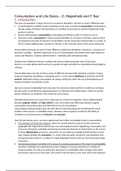Consumption and Life-Styles – D. Bögenhold and F. Naz
1. Introduction
The term consumption is vague and even in academic disciplines, the term is used in different ways.
In contemporary societies nearly everything can be seen as a kind of consumption. Consuming as
buying, eating, drinking, wearing clothes or travelling is processed as a kind of taking and using
goods or services.
Broad understanding: consumption is just taking something in order to receive or use it.
Narrower sense: consumption is almost always identified as a formal or informal contract which
accompanies processes of payment. Consumption can be measured economocially as a waste, in
terms of items getting eaten, burned or, literally, in the common sense of the word, consumed.
Consumption processes are part of many different academmic disciplines: economics - processes of
demand, sociology – symbolic expression of acts of consumptions and relates those observations to
classes and lifestyles, business administration – marketing and entrepreneurship
Societies have different histories, markets and cultures determining the rules of the game.
Norms in a society define which services or goods are legal and which are classified as being illegal or
criminal.
Consumption does not only involve a series of different processes like choosing a product, buying,
using and repairing something or managing waste. It is also about legitimacy of products and their
markets. Reflections about consumption are always reflections about the social embeddedness of
markets and their moral limits as well.
How we consume is dependent not only upon the concrete society and time in which we are living
but also upon our preferences, depending upon our lifestyles and related tastes, which are almost
always related to our position in the system of social classes.
Lifestyles determines very much of our taste and our criteria for happiness. Gans’s differentiation
between popular culture and high culture is very much about the difference between regular
consumption of practical value and distinctive forms of consumption.
Consumption practices always have the side effect of demonstrating and underlining the social
position of the owner in a stratified society. Likewise cultural capital is related to the ability to
contribute to social processes of inclusion and exclusion.
Over the last twenty years, we have experienced two further remarkable trends in consumption:
1. The evolution of electronic markets, which has transformed the nature of what used to be
geographically fragmented markets into one central global market. Digitalizing consumption and
processes of product evaluation and buying have become features of recent times. In the course
of those digitalization processes, consumers are accorded increasingly hybrid functions so that
they change partially into prosumers, i.e. actors who are partly consumers, but elsewhere also
entrepreneurial producers, or labour or wage dependent citizens who are more than just simple
consumers.
2. Increasing greening of societies in the sense of a growing awareness of the topic of sustainability .
Societies worldwide are experiencing serious changes in consumer behaviour in relation to
product quality, the nature of production processes in combination with ecological and social
parameters and issues of fair trade, all of which must be taken as new facts which also empower
, consumers. Especially consumers in the digital age are better informed than consumers in earlier
times so that they multiply negative information about brands or companies in the social media
worldwide very fast, which sets up new rules for international competition processes.
2. Consumption: Different Perspectives and Academic
Responsibilities
The term consumption is used in different academic disciplines in different ways. Depending on their
specific academic background, scholars ask how supply and demand or (production and
consumption) in business and society, are related to each other. Or they like to investigate how
individual people, social classes or societies realize their consumption practices. Furthermore,
consumption research inquires into the preference structures of individual actors, households or
classes and the rationalities which lead to their consumption behaviour. Finally consumption is also
concerned with the relationshiop between earnings and spending.
Modigliani’s life cycle theory of consumption was a remarkable contribution to the discussion on
consumption economics, distinguishing between consumers by age. People have changing
rationalities to spend (or save) money depending on their position in their life cycles.
Younger people make different plans and have differing consumption plans than older people.
An important reason for the increased attractiveness of the topic of consumption:
- The socioeconomic practices of people related to consumption patterns are somehow related to
their matererial conditions in society
- The division of material wealth in society
Historically and culturally changing times, competing life philosophies, political attitudes and various
other factors influence the (relative) autonomy of consumption behaviour.
Veblen’s discussion of conspicuous consumption went well beyond the possession of material
objects. He extended his socio-psychological analyses to religious practices, gender relations, sports,
the cultivation of accents and manners, as well as other factors not widely studies at the time.
Consumers as active agents Consumers will increasingly be able to influence, direclty or indirectly,
consumption patterns of available products and merkets. Consumers achieve specific profiles of
market making, resulting in the emergence of the term prosumers.
The growing trend towards so-called issues of sustainability and the greening of industry and society
creates new demands, provides new business opportunities and changes consumer profiles and their
consumption patterns.
The debate on globalization in particular explores whether consumption practices occur on an
international global level which are labelled elsewhere as the phenomena of an ongoing process of
McDonaldization.
Consumption processes are embedded in a web of socially constructed needs and wants which are
learned behaviour. This behaviour changes globally between generations, classes, lifestyles and
related preferences.









